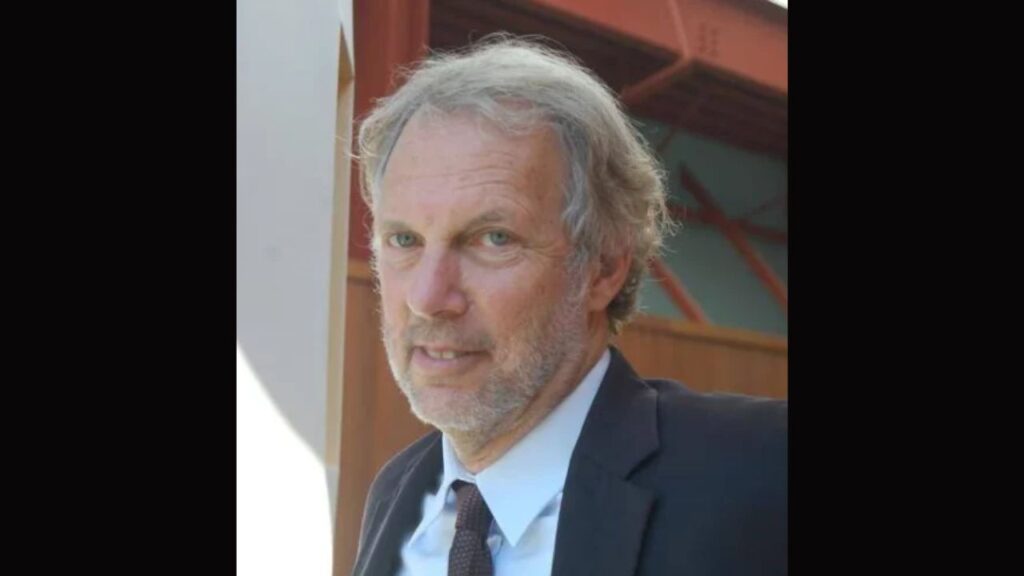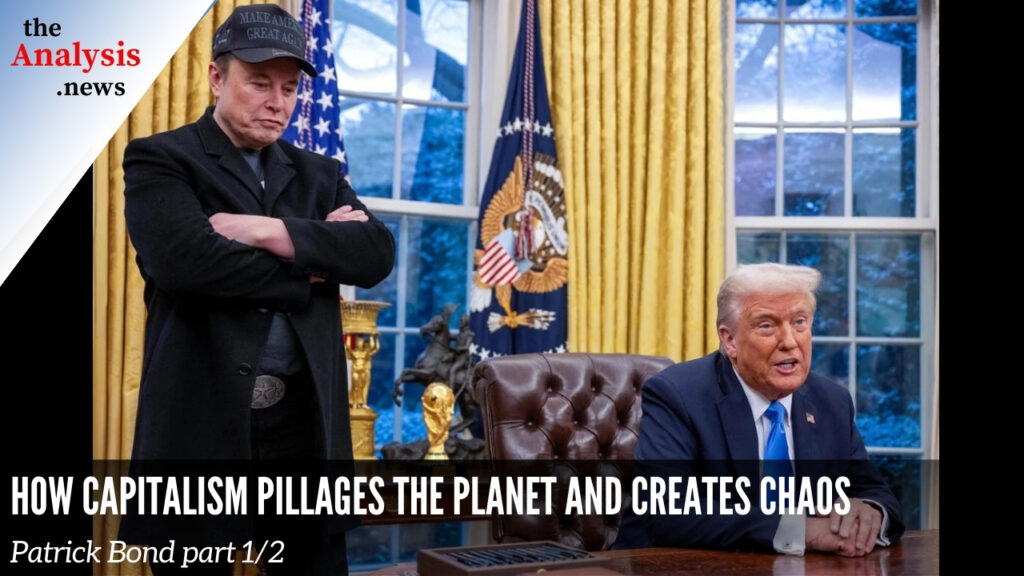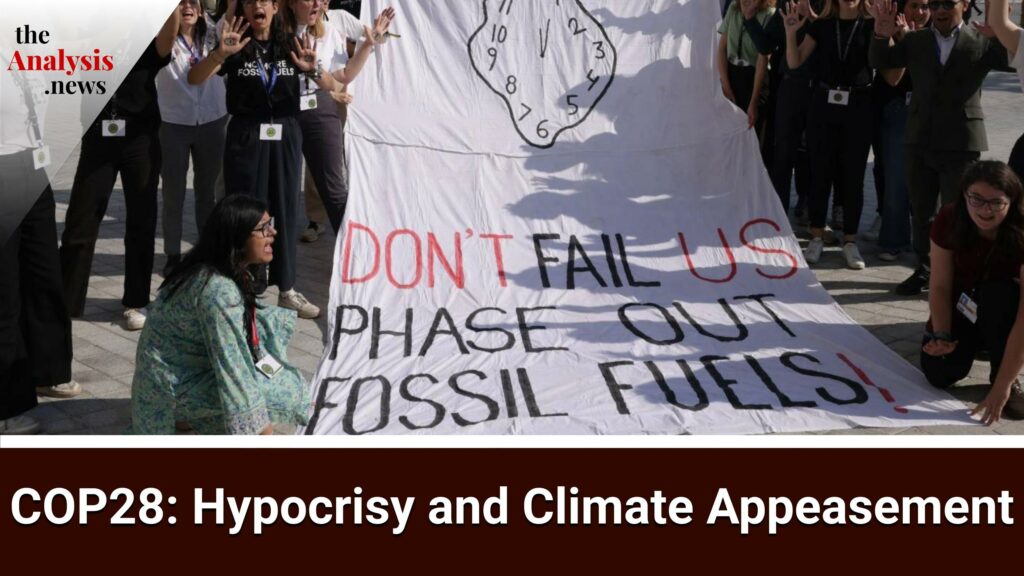Rebecca Burns, journalist at the investigative news outlet The Lever, discusses her reporting on extensive lobbying efforts to hold up legislation which would require companies to disclose all of their greenhouse gas emissions. In a recent report, she details how the same lobbyists who seek to derail progressive climate legislation in California are also getting paid by counties and cities along the California coast to deal with the impact of coastal erosion and fires.
Click here to read and support The Lever: https://www.levernews.com/
Talia Baroncelli
I’m Talia Baroncelli, and you’re watching theAnalysis.news. Today’s show features an incredible investigative journalist, Rebecca Burns, who’s been doing really great reporting on corporations lobbying against climate change legislation in the United States. Before we get to it, I’d like to encourage you to go to our website, theAnalysis.news, and make a small donation if you can by hitting the donate button at the top right corner of the screen. Also, get onto our mailing list; that way, you’re notified every time there’s a new episode. Like and subscribe to the podcast wherever you listen to your podcast, whether it be on Spotify or Apple, and also get on to our YouTube channel, theAnalysis-news. See you in a bit with Rebecca Burns.
Joining me now is Rebecca Burns. She’s a reporter and investigative journalist at the outlet run by David Sirota called The Lever, which has been doing really great work in the U.S. I’m really happy that you were able to join me today, Rebecca.
Rebecca Burns
Thanks so much for having me. Glad to be here.
Talia Baroncelli
Well, you’ve done extensive reporting for The Lever on lobbying against climate change legislation. One of your recent reports was on California’s climate crisis double agents. You’re speaking about lobbyists who receive money from towns and counties along the Coast of California to help them deal with the cleanup of coastal disasters, fires, and that sort of thing. They’re getting money to help with the implications of climate change, and at the same time, they’re spending money to derail or prevent really important climate legislation from being passed.
Rebecca Burns
For sure. As many of your listeners will know, the fossil fuel lobby is a formidable force in blocking climate action at the local level, at the state level, at the federal level, and internationally.
I recently highlighted some research done by a new climate group called F Minus that’s exposing one straightforward but shocking dimension of this, i.e. how many local governments, school systems, and environmental groups are paying, often with public money, the same lobbying firms that are also working for major fossil fuel groups.
The reason we highlighted this in California is that California is obviously already experiencing a lot of effects of the climate crisis and also has been a leader at the state level in passing climate action. They are considering, at the moment, and this is the final week of the legislative session there, some really significant climate legislation. At the same time, you have fossil fuel groups spending, I think it’s like $18 million just so far this year to defeat that legislation. You also have local governments employing, and again, paying with public money, the very same lobbyists.
Some of the examples that we highlighted, for example, the county of San Mateo. This is a coastal county and is pretty progressive. They have had to spend a lot of money, or communities within it have had to spend a ton of money on seawalls. It’s also the plaintiff in a really novel federal lawsuit suing oil companies and attempting to hold them accountable for the financial costs to local governments of dealing with climate change. At the same time they’re doing that, they’re hiring the same insider lobbying firm that’s working for BP and other defendants in this lawsuit. Even if they’re not lobbying on exactly the same legislation, you can imagine how there’s a real conflict of interest here. Some people have gone so far as to describe them as double agents.
They’re showing up at the State House sometimes on behalf of budgetary issues for local governments, often mundane things, but at the same time, helping push through or defeat the types of bills that are going to ensure that these local governments are going to continue to be clobbered by the cost of adapting and in some cases not being able to adapt to the climate crisis as it intensifies.
Talia Baroncelli
One of these lobbyist groups, I think they’re called Political Solutions LLC. As you said, they received money from San Mateo County, which is just south of San Francisco, to lobby on, I think it was child welfare issues as well as budgetary issues. I’m wondering, when these companies are pressed, what is their response? Do they say there’s no conflict of interest here? Are they hiding certain things? Or is it just a clear case of this money just being circulated and essentially laundered?
Rebecca Burns
Yeah, it’s out there in the open. They’re not breaking. There are, as we all know, pretty scant regulations governing what lobbyists can and can’t do. They have to report it, but it’s not like a law firm or something where you wouldn’t necessarily take clients whose interests are diametrically opposed. That’s a fairly routine thing to do in the lobbying business.
I think I did, for this story, reach out to a number of the counties. The Nature Conservancy even hired a group that’s known primarily as a fossil fuel lobbyist. I think it goes partially to being bought into the idea that if you have one of these insider firms that can really lean on its relationships in Sacramento, D.C., or wherever, you’re going to get a better outcome. I think, arguably, that’s a pretty myopic view. If you think about first how much our political system is distorted by money and politics and the huge influence of lobbyists and the fact that literally, you’re paying someone who, in another context, is working against your interests.
Talia Baroncelli
One of the things reported on as well was that some of these lobbyists had direct ties to the Governor of the State, Gavin Newsom. He’s behind a lot of, I guess you would call, progressive legislation to try and reach net zero by 2045. We’ll get into the net zero thing in a bit because there are some loopholes there, and if companies are not fully disclosing certain emissions, then it really doesn’t mean anything. He’s a relatively liberal Democrat in that sense. How beholden to these corporate interests would you say Gavin Newsom is?
Rebecca Burns
I’ll start with a specific case that you just mentioned. One of these particular firms, Axiom Advisors, which is very active in California on behalf of both fossil fuel lobbyists and then again was retained this year by the Nature Conservancy, was started by top advisors to Newsom, both when he was Lieutenant Governor and Governor. Clearly, they’re trading on their knowledge and their relationships. Gavin Newsom, I think people do give a lot of credit.
In its last legislative session, California passed some pretty significant climate legislation. There’s also been a lot of backtracking this year in terms of the spending that was committed to [climate legislation]. Newsom has really been pretty silent on all of the major climate legislation this year. There’s even a bill that has to do with cleaning up abandoned oil wells once they stop being productive that his finance department has opposed. Right now, we’re in a situation where he’s out-burnishing what looks like his credentials for a potential presidential run. I think a lot of environmental groups in the state are very frustrated that he’s just MIA, in particular, on some really significant climate legislation this session.
Talia Baroncelli
I think last year there was some federal legislation or draft legislation which would force companies to disclose all of their emissions, not just the scope one and two emissions, but scope three emissions, which are the downstream emissions, what emissions are being produced as a result of the production and consumption of their activities, essentially. I think there was a lot of lobbying against that legislation, particularly by asset managers like BlackRock.
In California, I think something similar has been happening as well. You’ve reported on how there’s also corporate lobbyism and lobbyists fighting to derail this legislation in California. Why don’t we speak about that?
Rebecca Burns
Sure. Well, let me start by giving folks a quick idea of when we say scope one, scope two, and scope three, what this means, and what the importance is. In all these situations, we’re talking about companies having to fully disclose and report their contributions to climate change. Advocates of this type of measure would readily admit, okay, this is really just the first step of a lot more action that’s needed, but so that we have a full picture of where the most carbon-intensive segments of our economy are so we can really focus on efficient and rapid decarbonization.
If you’ve heard in the last couple of years in particular, let’s take Exxon, for example, has a net zero commitment. Increasingly, most of the major oil companies at this time have a net zero goal, or sometimes they’ll say net zero aspiration to be a little more equivocal. There’s a sleight of hand going on there that sounds technical because it involves scope three emissions, but it’s really not. When we’re talking about reporting emissions, there’s a technical distinction drawn between, “I’m an oil producer, so at my immediate headquarters, both my corporate headquarters and on-site where there’s either drilling or refining going on, even if I’m trying to be energy efficient, my corporate employees are working in offices with energy-saving light bulbs.” There are the direct emissions that a company would produce and those that have to do with its purchase and use of electricity. That’s scope one and scope two. Then there’s everything else that has to do with if you’re an oil company. What actually happens when millions of people around the world and other companies burn your oil? Of course, when you think about it logically, that’s where the bulk of an oil company’s contributions to climate change are coming from. It is from those downstream emissions. The same goes for banks and asset managers like BlackRock.
Okay, you’ve reduced the number of flights that your corporate employees are taking. You didn’t send as many people to Davos or something, but if you’re funding fossil fuel projects, then, of course, you’re still making an enormous contribution to climate change. The discussion around scope three reporting is about those indirect emissions that, for many sectors of the economy, are where 90% of or more of their contributions to climate change are coming from. It’s harder and harder to be an outright climate denier if you’re a corporation. When we hear net zero pledges, particularly from oil and gas giants, a lot of time they’ve done just an accounting sleight of hand where they’re saying like, “Okay, we’re counting our electricity use and what’s in our buildings, but we’re not really going to worry about what actually happens when people use the product that we’re manufacturing. That’s outside of the scope.”
Talia Baroncelli
I’m actually not really aware of any cases in the U.S. or any states rather who have successfully adopted this legislation. Is this something that’s really new? Are there any states that have this disclosure legislation in place?
Rebecca Burns
Yeah. Let me go back to your previous question. California would be the first state to pass this type of legislation. There are federal rules proposed by the Securities and Exchange Commission that are pending. They’ve been delayed. It seems pretty likely that they’d be watered down to include less of this scope three disclosure, which is what we really care about if we care about figuring out how to efficiently and rapidly reduce emissions.
California’s legislation, in some ways, is a compliment to that, but in pretty important ways actually goes further. It applies to all companies, all large companies over a certain revenue threshold doing business in the state. California’s economy is so large that, effectively, it is all large companies doing business in the U.S. It also applies not just to publicly traded companies, which is what this federal agency has jurisdiction over, but just all large companies. It also makes those scope three emissions mandatory.
Effectively, we’ll see what happens this week. Some of the reporting timelines, as the bill has been amended, have been pushed out a little further, but it still would be a really significant step. Again, in just this, unfortunately, really basic step one, get the full picture of what emissions look like and where corporations really should be coming under pressure to reduce them quickly. If that passes in California, that effectively sets a new national standard.
Talia Baroncelli
Would you say that this push to have this legislation also goes hand in hand with some of the other efforts in certain states to essentially disclose where pension funds are putting their money? So, if they’re trying to ensure that they’re not funding fossil fuel companies or that these pension funds are not invested in these fossil fuel companies?
Rebecca Burns
Yeah. California did also have a Pension Fund Divestment Bill that stalled. It was also coming up against a really fierce lobbying campaign from oil and gas, also from some of the pension managers themselves who didn’t want to take this step. I’d say both of these are, in some ways, modest types of measures compared to the scale of action that’s required, but really important. I guess almost the low-hanging fruit of what we can really do with existing tools to understand the full picture of climate emissions and then also move one of the biggest sources of capital going often into fossil fuel funding, which is workers’ retirement savings.
Talia Baroncelli
Well, I’m sure people who read The Lever are really into environmental issues and are aware of Steven Donziger’s case. Steven Donziger is a human rights lawyer who was representing indigenous people in Ecuador fighting Chevron because Chevron was releasing toxic oil spills on indigenous land, and the Supreme Court of Ecuador was able to successfully convict Chevron. They unfortunately weren’t able to actually get any damages paid out. A really bizarre legal twist happened in New York, where the New York judge appointed a prosecutor backed by a law firm, which also had ties with Chevron. It was essentially like a corporate case against Steven Donziger. For a misdemeanour, he was forced to stay at home under house arrest for over a year. This case is really quite scary. It sets a really scary, dystopian precedent of the prospect of corporations going after lawyers and corporations actually having their own court to prosecute activists or lawyers.
You’ve done some reporting on what’s going on in Texas with Governor Greg Abbott having business courts there. I was wondering if there are any similarities in Steven Donziger’s case or if Greg Abbott is doing something completely different?
Rebecca Burns
Yeah, I think there’s definitely a broad similarity there, which, as you just noted, is, I think, a very valid concern about the court system. We all know the Supreme Court. It’s far from a neutral arbiter of justice. I think when you get to, in this case, state courts, justices there are often operating even further outside the public eye.
The Texas bill creating specialized business courts that did pass in the spring, supported by basically the whole oil and gas lobby and business community in Texas, would create this specialized court system that does exist in other states. What’s unique with the Texas situation is that Governor Abbott, among his corporate donors, he’s heavily supported by oil and gas, would have the ability to hand-pick justices who serve on these courts, and they would serve two-year terms. When I spoke to people, the thing there, first of all, just on a basic logistical level, that’s crazy. You don’t hear about that. Justices getting swapped in and out every two years that are selected by an executive branch official because he has the opportunity to replace them even more frequently than he’s running for re-election. The fear there is if there’s an outcome that basically one of his donors, one of his corporate donors, doesn’t like, it’s very easy to go and say, “Hey, I’m tied up in court.” If it’s an oil company, there are a number of types of corporate abuses that opens the door for. It’s easy for them to go to him and say, “I’ve been donating. We’re friends. This judge, I can’t get the summary judgment I want, or I’m getting my claim thrown out.”
I think the overlap there is the influence of oil and gas in the judiciary and the ways that can be weaponized against attorneys, against environmental activists, against other companies, against landowners who are trying to fight the seizure of their property for pipelines, and a lot of different potential, frightening possibilities there.
Talia Baroncelli
Yeah, another frightening possibility is what’s going on right now in Atlanta, Georgia, with 61 protesters being charged under the RICO [Racketeer Influenced and Corrupt Organizations] laws there for domestic terrorism, for protesting this massive police training site in Atlanta. There was a protester who was, I believe, shot with his hands up. Obviously, he wasn’t even armed. It was last year.
It’s not all doom and gloom. There are some cases that have been relatively successful, and let’s see if they’ll be taken to a higher court. Held v. Montana, for example, in the state of Montana, a district court ruled that the livelihood and health of young people are being endangered by the use of fossil fuels and that states should be held accountable for supporting the use of fossil fuels. I’m wondering if this is something which encourages you, or do you think that this will eventually be overturned if this goes to the state level and the state court of Montana will have to rule in accordance with its own constitution?
Rebecca Burns
Yeah, I think it is encouraging. I think it surprised the strength and unequivocal nature of that ruling. I think it happily surprised even close court observers of this type of climate legislation. I think in other states that already have that constitutional right to a healthy environment or some basis for that in their state constitution, there’s a lot of possibility. I won’t try and steer us back to the doom and gloom.
Something that was alarming that my colleagues David Sirota and Matthew Cunningham covered. There’s a federal lawsuit, a federal youth climate lawsuit brought initially under the Obama administration, that is now making its way through federal courts again. The Biden administration just filed its response. I believe it was in June, and their position, which is consistent with what the Obama administration and the Trump administration argued but is still striking, is that there’s no constitutional right to a livable climate. You can’t sue on that basis. Certainly, it’s striking and concerning to hear it put so plainly as that. We’ll see.
I think there’s a lot of really creative climate legislation out there and a lot of great thinking about how to use these types of legal maneuvers to go beyond just making a rhetorical point and actually shape or rein in state policies that are tipping us further and further in the opposite direction of where we need to be going.
Talia Baroncelli
Well, 10 years ago in Canada, on July 6, 2013, there was a horrible train incident. I was not even aware of this incident, and I’m Canadian, but I guess I wasn’t paying attention at the time, and living in Europe. This particular train was carrying crude oil, and I think it derailed and ended up killing over 47 people in a town in Quebec, Canada. I was wondering what the effect on legislation was, like if it even influenced U.S. legislation at the time.
The reason I’m bringing this up is because I also wanted to speak to you about some of the reporting that The Lever has done and that you’ve done on the East Palestine derailment in which a Norfolk Southern train carrying vinyl chloride derailed in Ohio. Then there was a controlled substance burn in which they released that substance into the air. I guess the reason they did that was because there was a risk of the train exploding or some of the carriages exploding, so they had to do that. One of the causes of the train accident was the reversal of Obama-era brake safety legislation. It was actually Norfolk Southern, the operator of this train, which had lobbied against that legislation to get it rolled back and reversed. I wonder if you’ve seen a continued deterioration or weakening of this safety legislation or if there have been attempts to strengthen it?
Rebecca Burns
There is a disheartening trend. When we were reporting on East Palestine, which got a lot of national, in some cases, international attention, as a situation because you can really imagine how distressing it is as a resident of a small town or as a first responder to see a chemical cloud and for it to take days to know even what you were exposed to. Now, thousands of people are in a situation where they just don’t know what effect it will have on them long term because a lot of this chemical exposure really takes years before you know what the impact on you, your loved ones, your community is going to be in terms of long-term health outcomes.
Something that was, I think, distressing as we were looking back at situations like, I think, Lac-Mégantic as you mentioned, other horrific train disasters is that there are really more of these types of calamities than we often remember, and they tend to follow a pattern where there’s a lot of short-term attention and then not a lot changes. Certainly, in East Palestine, safety legislation was introduced. It’s called the Railway Safety Act. There are ways in which it either doesn’t go far enough or has been watered down.
My colleague, Julia Rock, has been reporting on some of the ways that the bill, even since its initial form, has been weakened a bit. The big picture there, unfortunately, is it’s stalled at the moment, despite all of the Democrats and Republicans making hay out of the situation in East Palestine at the moment. They don’t have the votes to get it passed. We’ll see what happens there.
We also, when we were covering East Palestine, highlighted a number of the steps that Secretary of Transportation, Pete Buttigieg, could take. There is a pending two-man crew rule. Infamously, the train that derailed in East Palestine was being operated, I think, by two people and a trainee, I believe. As the railroad industry has pushed a slash cost and slash staffing, there’s been talk of having these mile-long trains operated by just one person. There is a pending Department of Transportation rule that would require a minimum of two people. That’s also installed, and the proposed version certainly isn’t as strong as a lot of the rail unions would like to see. We’ll see. I think there was a lot of really important attention to that situation. A lot of fixes that rail unions have been fighting for, and in some cases, had important advances in winning more paid sick days and raising issues about the need to invest in both staffing and maintenance in order to have a safe railway system that we all depend on.
At the moment, I would say real workers have won a lot more through their organizing than we’ve seen passed at the legislative level in terms of improvements.
Talia Baroncelli
I don’t want to speculate, but do you think it was really necessary, based on the reporting that you’ve done and the reporting that Julia Rock has done, to have the controlled release of those toxins right in East Palestine? Or was it just an instance of these are people who are poor white people who are maybe even expendable? We don’t really care so much if we have to do a controlled substance release here in the middle of nowhere, basically in Ohio. Or is that just reading too much into it and being too pessimistic?
Rebecca Burns
Yeah, I think it’s certainly an important question to ask. I personally can’t speculate. I haven’t looked closely at that issue and whether there’s been a further investigation of it. At the time, chemical and a few railway safety experts expressed concerns based on what you just said. I think someone who was interviewed pretty soon after that decision said we basically nuked a town in order to get the railroad up and running again. It seems certainly plausible that expediency and getting the line open again may have been a concern there.
In terms of the specific decision-making process that went into it, I don’t know. One of the National Transportation Safety Board has released some of the preliminary results of its investigation. I think what we and The Lever were really focused on was trying not to speculate about the specifics of this incident that we aren’t in a position to know but say, “Hey, these broader regulatory issues that perhaps were not the immediate or only cause but almost certainly contributed, these are things that people have been talking about for decades and that industry has just gotten its way on every single time that the issue has been raised.”
Talia Baroncelli
Well, the reporting that The Lever has done has been incredibly factual and has, in certain instances, elicited a response from lawmakers. I think that shows how important the reporting has been. I encourage everyone to support The Lever with donations because this reporting is really crucial to exposing what’s going on and to pressing lawmakers to actually come forward with certain changes.
Rebecca Burns
Thank you so much. Our tagline is “Hold Them Accountable.” You can find us at levernews.com.
Talia Baroncelli
Well, thanks, Rebecca Burns. It was great to have you on. Thank you for watching theAnalysis.news. Feel free to go to our website, theAnalysis.news, and donate to the show if you like this content. You can also get on our newsletter; that way, you’re updated every time there’s a new episode. Like and subscribe to our show wherever you watch your podcast. See you next time.
Podcast: Play in new window | Download | Embed
Subscribe Apple Podcasts | Spotify | Android | iHeartRadio | Blubrry | TuneIn | Deezer | RSS
Never miss another story
Subscribe to theAnalysis.news – Newsletter
Rebecca Burns is a journalist, professor, author, and speaker in Athens in the U.S. State of Georgia. Burns has taught journalism at Emory University and the University of Georgia.


















